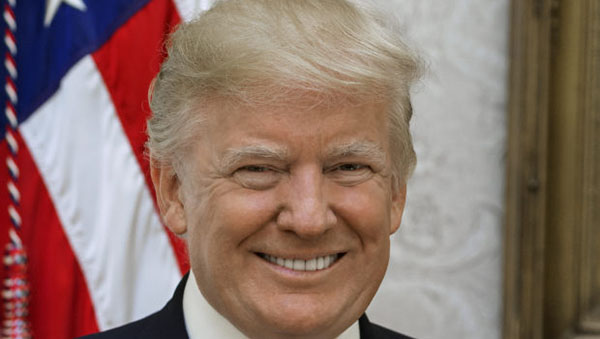As a nation struggles to oust US President Donald J. Trump, have they already been out-trumped?
By Yvonne Sam
Political and Social Commentator
 US Attorney General, Rod Rosenstein, owes the nation, and by extension, the world, an answer.
US Attorney General, Rod Rosenstein, owes the nation, and by extension, the world, an answer.
Donald J. Trump, the president of the United States, is under investigation by a special counsel, appointed by the Justice Department, for precisely what federal crimes?
It is grossly unacceptable that, after more than two years of burrowing— the 16-month Mueller probe, having been preceded by the blatantly suspect labors of the Obama Justice Department and Federal Bureau of Investigation — an answer to that simple question still eludes us.
Factually we deserved an answer right from the outset — i.e May 17, 2017, the very moment Rosenstein appointed Special Counsel, Robert Mueller 111, under Deputy Attorney General Order No 3915-2017 www.law.cornell.edu/cfr/text/28/600.1
The regulations, governing the appointment, require that (a) a legitimate basis for believing that a federal crime, meriting investigation or prosecution, has been committed www.law.cornell.edu/cfr/text/28/600.1; (b) a conflict of interest, so compelling that the Justice Department is unable to investigate this suspected crime in the normal course; (c) an articulation of the factual basis for the criminal investigation — i.e., the investigation of specified federal crimes — which shapes the boundaries of the special counsel’s jurisdiction. www.law.cornell.edu/cfr/text/28/600.4.
The final proviso is fashioned to prevent a Special Counsel’s investigation from being transformed into a fishing expedition, or in President Trump’s terms, “a witch hunt”; what Deputy Attorney General Rosenstein more subtly disclaims as an “unguided missile”; and what Alan Dershowitz, of Harvard Law School fame — invoking Lavrenty Beria, Stalin’s depraved and blood-thirsty executioner — criticizes as the warped maxim: “Show me the man and I’ll show you the crime.” www.oxfordeagle.com/2018/05/09/show-me-the-man-and-ill-show-you-the-crime/
In America the crime generates the assignment of a prosecutor, and not the converse.
The regulations are upheld by sound reasons, and had a Democrat been occupying the White House, we would have known them by now. Sadly, the character flaws of President Donald Trump’s has the Republicans shrugging their shoulders, resigned that he deserves to be investigated, whether he committed a crime or not.
 Until now, the justification for the regulations relates to the presidency, and not to the individual, who happens to occupy the office at a particular time. It is too crippling to the governance of the United States, to the pursuit of America’s interests in the world, for the nation to continue imposing on the presidency the heavy burdens of defending against a criminal investigation, unless there is convincing and overwhelming evidence that the president has committed a serious crime.
Until now, the justification for the regulations relates to the presidency, and not to the individual, who happens to occupy the office at a particular time. It is too crippling to the governance of the United States, to the pursuit of America’s interests in the world, for the nation to continue imposing on the presidency the heavy burdens of defending against a criminal investigation, unless there is convincing and overwhelming evidence that the president has committed a serious crime.
As portrayed by the recent hearings on the Supreme Court nomination of Brett Kavanaugh, the Democrats are seemingly too Trump-deranged in this moment to recognize their interest in avoiding a prosecutor’s cloud over future Democratic administrations.
(Perhaps they are laboring under the misapprehension that no Democratic attorney general would appoint a special counsel, regardless of the evidence, and that the media would willingly play along.)
As a result it is entirely up to Republicans to respond to the damage being done to the office. This may prove a difficult undertaking.
Should policy be all that carries any weight, then the Trump presidency would be a rousing success. The economy is humming. The yokes of tax and regulation have been eased to the extent that, despite tariff hijinks, unemployment has plummeted and employers have trouble filling positions. Alas! there is more to it than policy.
The current investigation is about the presidency, not the president. Then to be absolutely clear, if there is reasonable cause to believe that Donald Trump was criminally duplicitous in Russia’s interference in the 2016 U.S election, then he must be investigated, and the nation must resign itself to the compromised administration that results. But we have never been told, much less shown, that this is the case. It is supposed to be established before the investigation commences.
In the interim, not only have millions of public dollars been expended on Mueller’s investigation; administration officials have also had to go into their own pockets, paying millions in legal fees to defend themselves and comply with the demands of the Special Counsel.
On the other hand, Executive officials have been forced to deal with Congress and foreign leaders, while hindered by criminal suspicion of the president. Trump aside, the signal has gone out to the meritorious people we should want to serve in future administrations: Why leave your prestigious, profitable job to serve in government and risk financial and reputational ruin?
What is the crime? Again there is one thing and one thing only that would justify the appointment of a special counsel: concrete evidence that Donald Trump committed a crime in connection with Russia’s election interference.
So, to repeat: for precisely what federal crime is the president of the United States under investigation?
Rosenstein owes us an explanation. From Day 1 both Rosenstein and Mueller’s staff have side-stepped this obligation, by arguing that nothing in the special-counsel regulations requires a public recitation of the factual basis for the investigation. www.law.cornell.edu/cfr/text/28/600.10.
This notwithstanding, since Watergate in every independent-counsel investigation, both the president and the public have been apprised of exactly what crimes commanded an investigation.
The Supreme Court’s constitutional statute and rationalization in Morrison vs Olson (1988), and delivered by Chief Justice Rehnquist, showed that prior to the appointment of an independent counsel, the Justice Department must first provide carefully established evidence of specific criminal – law contraventions. www.law.cornell.edu/supremecourt/text/487/654.
It is evident that the shroud of uncertainty or mysticism is certainly not lifting. In April this year Reuters reported that Rod Rosenstein told Donald Trump that he is not a target in the Russia Probe. www.reuters.com/article/us-usa-trump-russia-target/rosenstein-told-trump-last-week-he-is-not-a-target-in-russia-probe-idUSKBN1HQ2XI. If this is true, that would not mean the president is not a subject of the probe.
On the other hand, if he is not, then why have we not been told that? Why has it not been announced that the Trump aspect of the investigation is closed — if, indeed, it was ever open in the first place? We have to assume that Trump is, and has been, under criminal investigation, even if there is not, and has never been, a crime.
As special counsel Mueller is expected to provide a report to Rosenstein (www.law.cornell.edu/cfr/text/28/600.8) who will then decide (www.law.cornell.edu/cfr/text/28/600.9) what parts of the report to share with Congress and the public?
This is seemingly the rationale, underlying Mueller’s thoroughness: he must be comprehensive, even if he finds no prosecutable crimes. Lying in wait are the Democrats, who conjecture that such a thoroughgoing, narrative report will form the basis for an impeachment of the president.
Although impeachment does not require proof of courtroom-prosecutable misconduct, but of any misconduct Congress might determine is — or might inflate into — high crimes and misdemeanors.
Let us not be distracted or retracted but instead return to first principles. The way things are supposed to be done: first the Justice Department must describe the factual basis for specified crimes, not shameful, erratic behaviours; crimes that the special counsel is authorized to investigate.
Should the Special Counsel desire to investigate other crimes, he is supposed to ask for an expansion of his jurisdiction. When the special counsel writes his report, it is supposed to be about why prosecution of those crimes should be either authorized or declined www.law.cornell.edu/cfr/text/28/600.8
So here’s the crunch for those who never had a hunch — Mueller is a prosecutor, employed by the Justice Department, and not as is ongoingly assumed, counsel for a congressional impeachment committee. His chief task is to report his prosecutorial decisions about crimes he has been authorized to investigate, because the Justice Department is conflicted. It is not to hold forth on his assessment of Donald Trump’s overall comportment and fitness to be president. Such is for voters, or their elected representatives, to determine.
So what are the suspected crimes, committed by Donald Trump, that Mueller has been authorized to investigate, and what was the factual basis for Rosenstein’s authorization of this investigation?
A nation and the world over, still haven’t been told. Much is not being asked for. After 16 months, an answer is being sought as to why there is a criminal investigation of the president. If Rod Rosenstein would just explain what the regulations call for him to explain — namely, the basis to believe that Donald Trump conspired with the Kremlin to violate a specific federal criminal law, or is somehow criminally complicit in the Kremlin’s election sabotage — then we can all get behind Robert Mueller’s investigation.
But what is the explanation? And why is it not being demanded by the Republican-controlled Congress?
Now is the time Mr. Rosenstein, to tell Americans what is the crime? What’s the legal basis for the special-counsel investigation? We have a right to know.
Yvonne Sam, a retired Head Nurse and Secondary School Teacher, is Vice-president of the Guyana Cultural Association of Montreal. A regular columnist for over two decades with the Montreal Community Contact, her insightful and incursive articles on topics ranging from politics, human rights and immigration, to education and parenting have also appeared in the Huffington Post, Montreal Gazette, XPressbogg and Guyanese OnLine. She is also the recipient of the Governor General of Canada Caring Canadian Citizen Award.
 Pride News Canada's Leader In African Canadian & Caribbean News, Views & Lifestyle
Pride News Canada's Leader In African Canadian & Caribbean News, Views & Lifestyle





